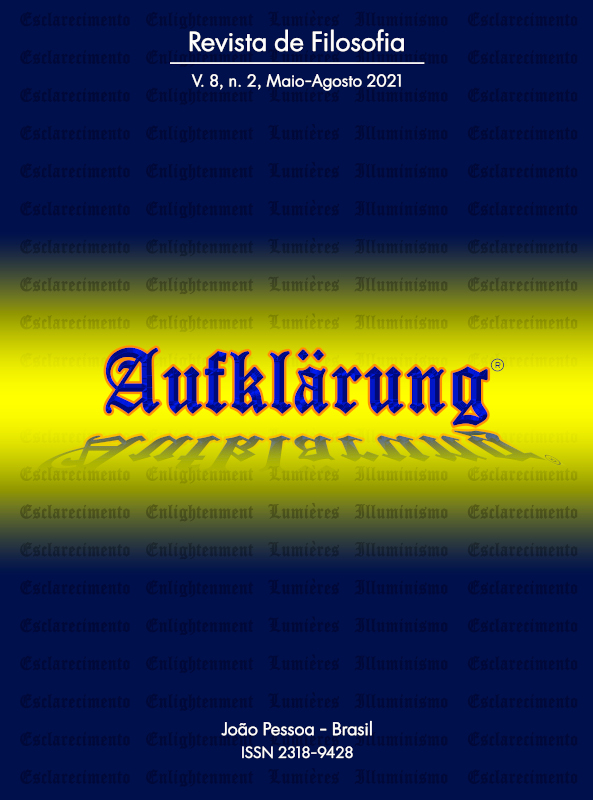External coertion as a guarantee of civil rights according to Kant
DOI:
https://doi.org/10.18012/arf.v8i2.58884Keywords:
External coertion. Civil Rights and Duties. Freedom. Philosophy of law.Abstract
In this article we will deal with external coercion in Kantian thought, according to the political-legal duty that governs civil society. The question to be answered is: according to Kant, does the republican state, through external coercion resulting from legal laws, guarantee the rights of individuals within the scope of civil society? We intend to undertake an analysis of the relationship between the law and the individual through the coercion employed by the republican state. The methodological procedures adopted to carry out this research have a hermeneutic character, since it consists, especially, in the privileged reading, analysis and interpretation of Kant's main works on the doctrine of customs where the legal discussion is inserted, in a special way, Metaphysics of Customs, Perpetual Peace, Idea of a universal history from a cosmopolitan point of view, Lessons in Ethics, among others. Our text is structured in three parts, the first being the theoretical contextualization of the problem in Kantian theory and the last two as an answer to our question. Our research is justified by its timeliness because in contemporary societies governed by a republican constitution, both duties and rights are the subject of political struggle and legal regulation. Kant at the height of the German Enlightenment in the 18th century allows us to understand that the freedom of the citizen, which is limited by the legal law in civil society, is also ensured through them.
Downloads
References
ARENDT, H. Lições sobre a filosofia política de Kant. Rio de Janeiro: Relume & Dumará, 1994.
BOBBIO, Norberto. Direito e Estado no pensamento de Emanuel Kant. 2ª edição. Brasília – DF: Editora Universidade de Brasília, 1969.
BRASIL. [Constituição (1988)]. Constituição da República Federativa do Brasil de 1988. Brasília, DF: Presidência da República [2016].
CAYGILL, H. Dicionário Kant. Rio de Janeiro: Jorge Zahar, 2000.
HECK, J.N. Direito e moral: duas lições sobre Kant. Goiânia: Ed. UFG/UCG, 2000. GUYER, P. Kant. São Paulo: Ideias & Letras, 2009.
KANT, Immanuel. Metafísica dos Costumes. 3ª edição. Petrópolis, RJ: Editora Vozes, 2017.
KANT, Immanuel. Fundamentação da metafísica dos costumes. 1ª edição. São Paulo: Abril S.A. Cultural e Industrial, 1974.
KANT, Immanuel. Lições de Ética. 1ª edição. São Paulo: Editora Unesp, 2018.
KANT, Immanuel. À paz perpétua: um projeto filosófico. Petrópolis: Vozes, 2000.
KANT, Immanuel. Sobre a pedagogia. Lisboa: Portugal: Edições 70, 2018.
KANT, Immanuel. Ideia de uma história universal de um ponto de vista cosmopolita. 2ª edição. São Paulo: Martins Fontes, 2004.
RAMOS, Cesar Augusto. Coação e autonomia em Kant: as duas faces da faculdade de volição. ethic@ - An international Journal for Moral Philosophy, Florianópolis, v.07, n.1, p.45-68, dez. 2010. Disponível em: <>. Acesso em: 27 abr. 2020. doi:.
RODHEN, V. (Coord.). Racionalidade e ação. Porto Alegre: Goethe-Institut, 1992. SANTOS, Robinson dos. Liberdade e coerção: a autonomia moral é ensinável? Studia Kantiana, v.11, n.1, p. 201-216, 2011. Disponível em: . Acesso em: 27 abr. 2020.
TERRA, R. A política tensa: ideia e realidade na filosofia da história de Kant. São Paulo: Iluminuras, 1995.
Additional Files
Published
How to Cite
Issue
Section
License

This work is licensed under a Creative Commons Attribution 4.0 International License.
Journal general policy
1.This journal works under a Creative Commons License aplied to online journals. That icence can be read in the following link: Creative Commons Attribution 4.0 International (CC BY 4.0).
2.Accordingly to this License, a)the journal declares that authors hold the copyright of their articles without restrictions, and they can archieve them as post-print elsewhere. b)the journal allow the author(s) to retain publishing rights without restrictions.
Metadata Policy for information describing items in the repository
1. Anyone may access the metadata free of charge at anytime.
2.The metadata may be re-used in any medium without prior permission, even commercial purposes provided the OAI Identifier or a link to the original metadata record are given, under the terms of a CC BY license refered for the Journal.







































